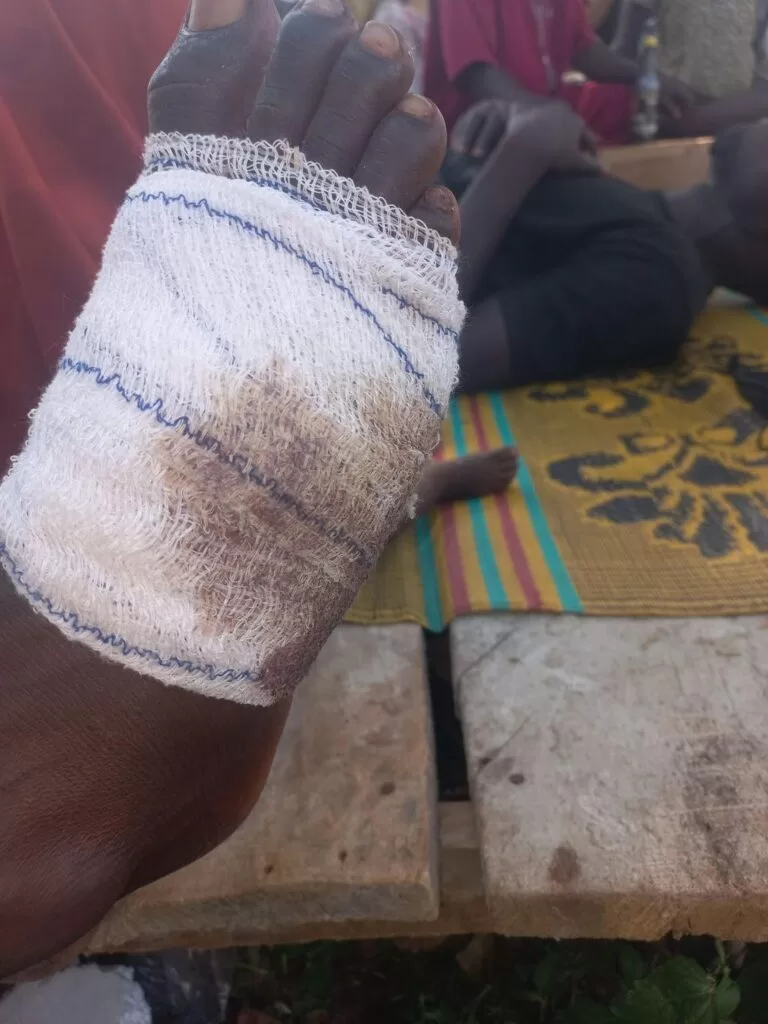Beneath the blazing sun of Abuja, the Federal Capital Territory (FCT) in Nigeria’s North-central, smoke spiralled skyward, marking the harrowing end of a week-long state-sanctioned demolition exercise. What began with a terse two-day notice on Nov. 5 culminated in the displacement of thousands, a gunshot injury, and countless belongings reduced to ashes.
The affected shanty communities—Ruga I, II, and Yangyada—offered refuge to settlers for decades. Now, they are desolate, bearing scars of chaos and destruction, with only debris and scorched earth as remnants of their existence.
The operation, dubbed Operation Sweep, was conducted by a ministerial joint task force comprising personnel from the Nigeria Police, Nigerian Civil Defence Corps, Immigration, and the Nigerian Air Force, among others. Panic spread quickly as bulldozers advanced, accompanied by uniformed officers. Families scrambled to salvage what little they could, children clinging to their parents as the cacophony of destruction filled the air.
Earlier in November, Nyesom Wike, the FCT’s Minister, launched Operation Sweep to demolish settlements “that pose a security threat” in the capital city. Such demolition exercises are not new to Abuja. Between 2003 and 2007, more than 800,000 residents were forcibly evicted from their homes in a four-year campaign to restore order to the city’s chaotic urban planning.
A spokesperson of the shanties disclosed that the communities have been demolished 22 times in the last 39 years, but the settlers have always returned since they do not have alternatives.
Shot fired, belongings burned
Eyewitnesses told HumAngle that during the recent exercise, one resident at Ruga II, identified only as VIP, was shot in the foot by an immigration officer as he tried to retrieve his belongings.
“When the demolition began, it started from where our rooms were. So, my friend [VIP] rushed into his room to pick up some of his valuable documents, including his national ID. A police officer insisted he vacate the premises, but he also insisted on getting his belongings,” said Abdullahi Yusuf, a friend of the victim who witnessed the incident. “While they were arguing with the police officer, the immigration officer approached them and shot my friend in his foot.”
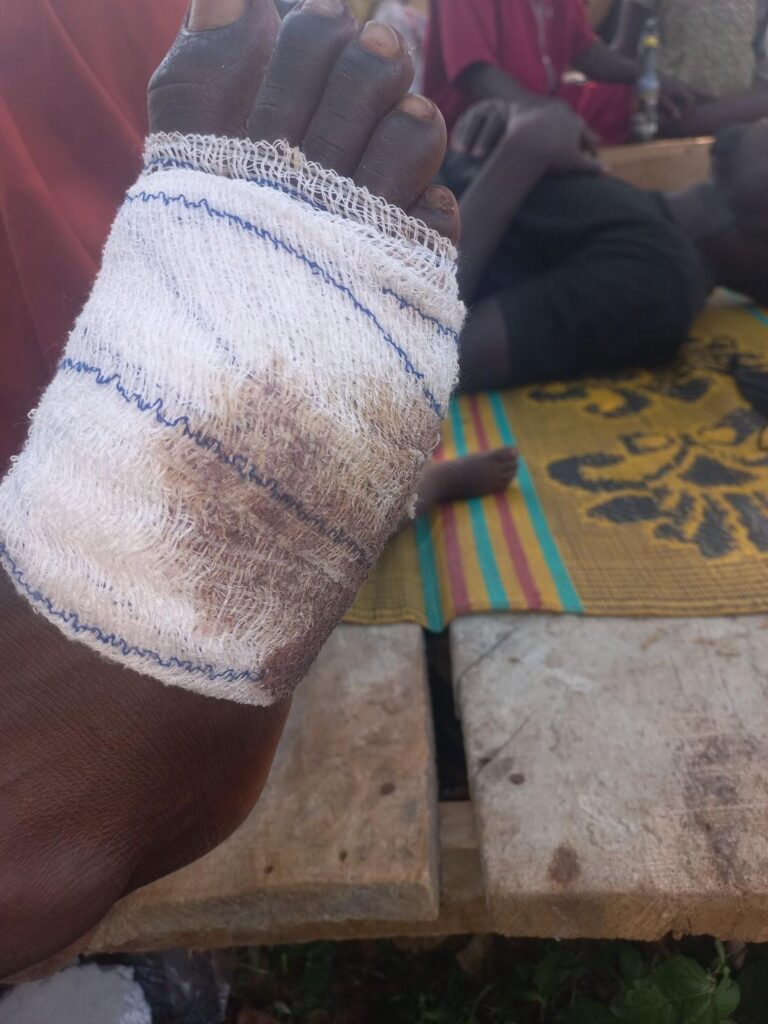
Yusuf recounted the panic that followed. Blood pooled at the site of the shooting as onlookers scattered. He revealed that it was a police officer who pleaded with his friend, VIP, to move to safety as the officer threatened to take another shot.
VIP was rushed for first aid and has since been moved to Kaduna State in the country’s northwest for treatment.
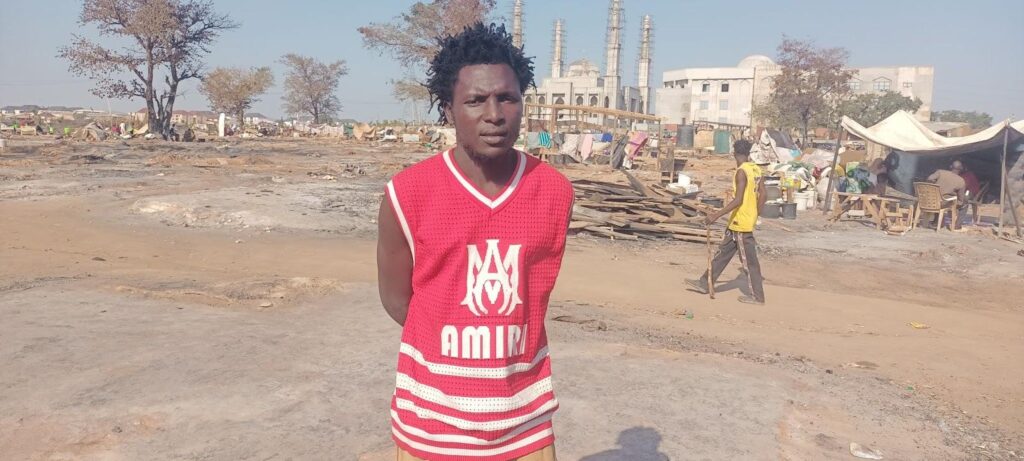
For others, the trauma came not from bullets but from flames. Hasiya Abdullahi, a widow and mother of five, described the horror as officials set fire to belongings after demolishing homes.
“After they demolished our houses, they set our belongings on fire. They burnt our clothes and the little foodstuff we were managing,” she said.
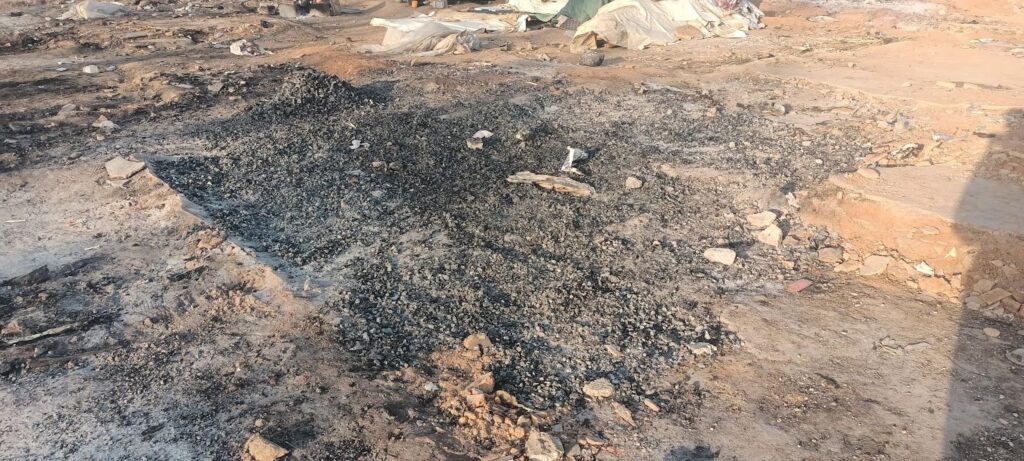
Lere Olayinka, the Senior Special Assistant on Public Communications and New Media to the FCT Minister, reiterated to HumAngle that the demolition was part of efforts to remove unauthorised structures deemed security threats. He explained that the settlements were illegally occupied and had been demolished in previous government efforts.
However, Olayinka stated that he was unaware of any reports of brutality or shootings during the operation, adding that the “Minister’s office would not comment on unverified information.”
Gales of displacement
Hasiya, who is in her late forties, had been bedridden with malaria when the bulldozer arrived. Unable to walk, she barely crawled to safety as her children hurried to save their meagre possessions. She revealed that the heat from the blazing fire and the sun was so intense that some people collapsed.
Hasiya and her family now sleep under the open sky, battling cold nights and relentless mosquitoes. “I can’t sleep at night for the safety of my kids. I have to be awake,” she added.
This is not Hasiya’s first or second displacement experience, but she said, “This situation is the worst.” With no money and an alternative place to move to or fend for her children’s wellbeing, she has decided not to move an inch from the demolished area.
When HumAngle visited these communities on Nov. 12, we observed charred remnants of homes, burnt-out trees, and the ashes of lives uprooted.
According to Ibrahim Yusuf, secretary of the Ruga communities, over 10,000 residents in all the communities had been displaced. HumAngle cannot independently verify this number.
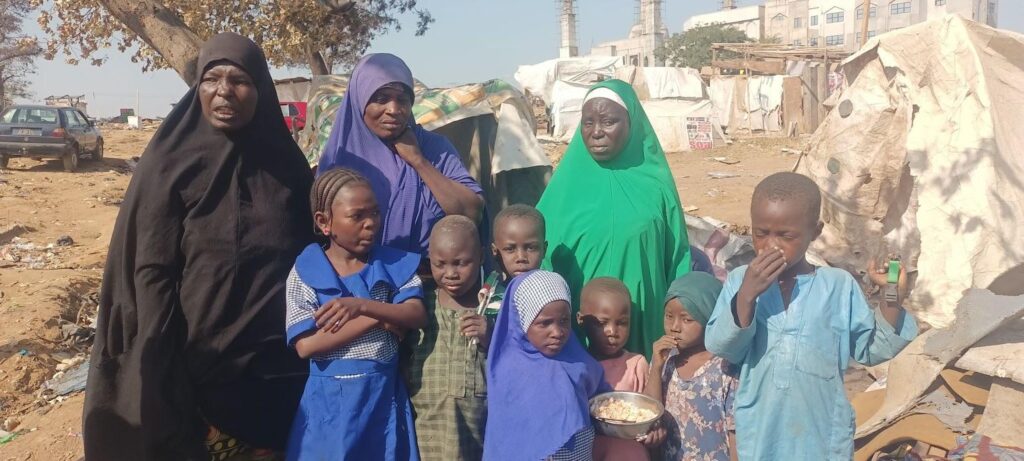
Businesses count losses
Among the displaced are business owners like Abobi, a barber whose salon also served as his home in Ruga. He received news of the demolition while visiting his hometown in Kogi State. By the time he returned, all he owned—a plasma TV, two clippers, and furniture worth over ₦300,000 ($178)—was gone.
“I didn’t even remove a pin from my shop,” Abobi told HumAngle.
“For now, I don’t even have the means to build back the business, so I have decided to continue under this tree for survival. Even before the demolition, we’ve been struggling to survive; now, they have taken everything from us. No business, no place to rest our heads,” he said dejectedly.
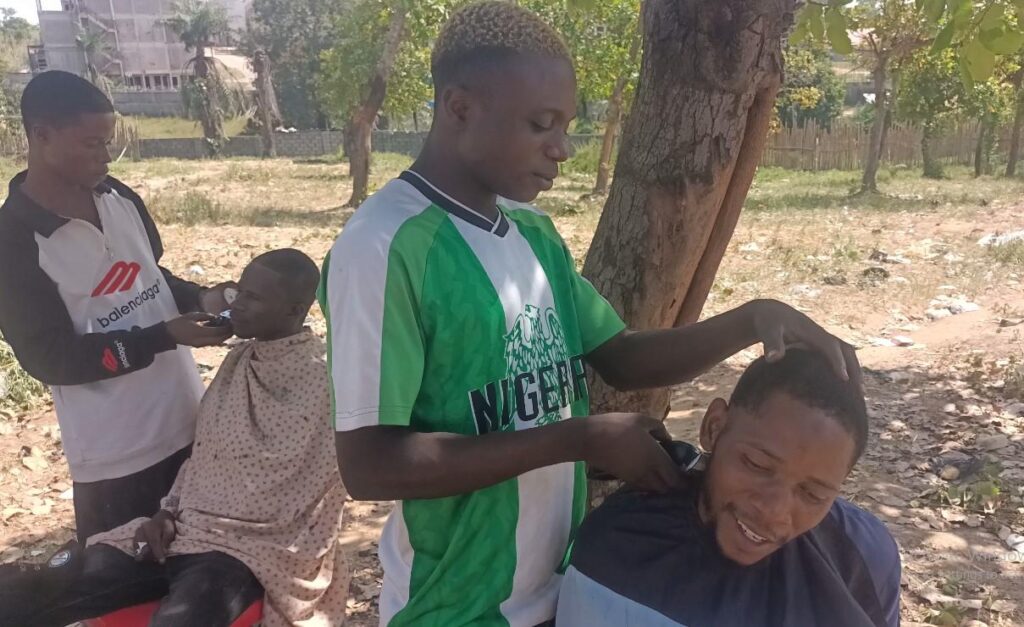
Another trader, Shamsudeen SK, recounted similar losses. For Shamsudeen, the demolition came as a shock “even though this is not the first or second time it is happening,” he said. This is the seventh—and by far the worst—he has experienced.
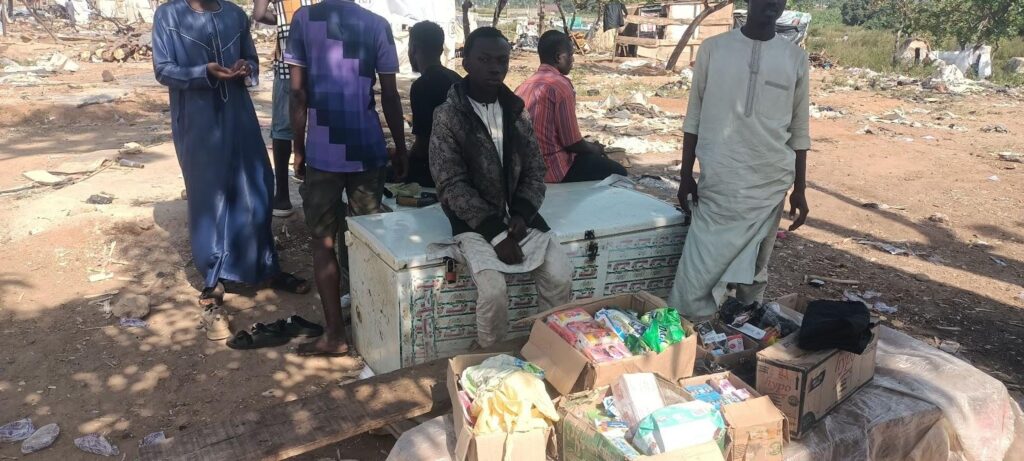
Shamsudeen has been a trader all his life, carrying out his business in the community for over a decade. Now, he is left with no shop as he struggles under a tree for survival.
“My business has been gravely affected because the people who patronise me have been displaced. I don’t think I can recover for now until normalcy is restored,” he said. “It will cost me around ₦100,000 ($59) to rebuild it. I can’t afford that for now.”
Both business owners appealed to the FCT Minister, Nyesom Wike, to address their plight by providing an alternative location to rebuild their lives and businesses. They emphasised the urgency of their situation, given the country’s challenging economic conditions.
“We are not criminals”
Although the FCT Minister has continued to defend the demolition as a necessary measure to remove illegal structures and curb criminal activities, community leaders refuted claims that their settlements harboured criminals.
Ibrahim Yusuf, the Ruga community’s secretary, denied the allegations. He said the communities have internal security, consisting of vigilantes and a Civilian Joint Task Force (CJTF), which has been very proactive in combating crimes within and outside the communities.
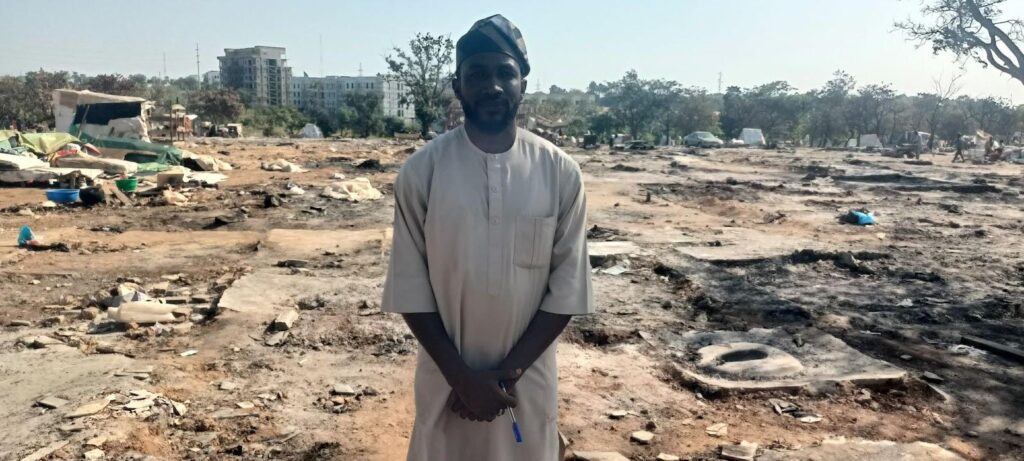
“It has been safe living within this environment because we have always ensured zero tolerance to any form of vandalism or criminal activities through our internal security,” Yusuf added.
He revealed that on several occasions, the community supported the police on the issue of security and gave them beneficial information. “Saying we harbour criminals in our community is a mere allegation that will remain such,” he emphasised.
A cry for justice
According to the National Coordinator of the Human Rights Writers Association of Nigeria (HURIWA), Emmanuel Onwubiko, while the government has the right to remove illegal settlers from any of its property, it must also give settlers adequate quit notice.
“Whether a structure is legal or illegal, the government ought to provide sufficient notice for them to remove their properties because constitutionally, every Nigerian has a right to his property [moveable and immovable],” he said.
Onwubiko added that the government ought to work out plans, including providing an alternative settlement for the affected people, with special considerations for women and children. He said the government can only act otherwise if they ignore the allotted time.
He warned that displacing people without recourse to its implication will only aggravate the displacement concerns eminent in the country. Over 3.3 million people are said to be forcibly displaced within Nigeria, according to the United Nations.
“If you’ve ejected a people and they are already on the street, you have created a serious existential crisis for the country because you have rendered people homeless and driven them into destitution, and some of them may go into social crimes,” he warned.
Isa Sanusi, Director of Amnesty International Nigeria, echoed similar concerns, highlighting that forced evictions and demolitions exacerbate residents’ struggles and could deepen Nigeria’s existing inequality.
Lere Olayinka, the FCT Minister’s spokesperson, told HumAngle that the minister recently met with representatives from the community to discuss relocation options.
For now, Ruga I, II, and Yangyada residents remain uncertain, their lives reduced to rubble. Under makeshift shelters, they wait—some for aid, others for answers, and many for justice.
